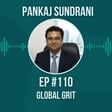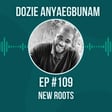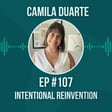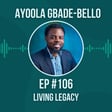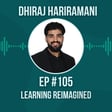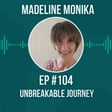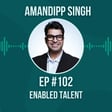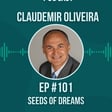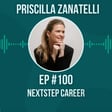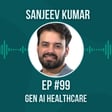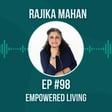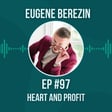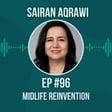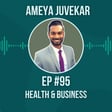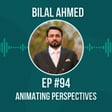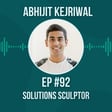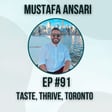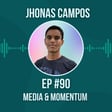Become a Creator today!Start creating today - Share your story with the world!
Start for free
00:00:00
00:00:01

#81 STEM Revolution w/ Ritu Jhaveri
Ritu is a tech-edupreneur on a mission!
With over 12 years of experience in education across the globe, Ritu has worn many hats – from a humble teacher to a proud school principal, spanning across Canada, Singapore, Dubai, and India.
Her passion lies in STEM education, and she is driven to revolutionize how students interact with science, technology, engineering, and math. Currently, she’s the co-founder and CEO of Deschool Online Inc, where they are paving the way for top-notch STEM courses for K-12 students in Canadian schools.
Recommended
Transcript
Introduction to the Podcast & Hosts
00:00:02
Speaker
Welcome to the Find A Way podcast, where we celebrate the remarkable journeys of immigrant entrepreneurs who have founded startups in North America.
00:00:12
Speaker
And we are your hosts, Beatriz Anatelli and Ingrid Polini.
00:00:17
Speaker
Join us as we dive deep into the personal stories of these inspiring individuals, exploring their challenges, triumphs, and the diverse range of innovative companies they have built.
Guest Introduction: Ritu Javieri
00:00:33
Speaker
This is episode number 81, STEM Revolution, and today our guest is Ritu Javieri.
00:00:39
Speaker
Ritu is a tech edupreneur on a mission.
00:00:42
Speaker
With over 12 years of experience in education across the globe, Ritu has worn many hats from a humble teacher to a proud school principal, spanning across Canada, Singapore, Dubai, and India.
00:00:54
Speaker
Her passion lies in STEM education, and she is driven to revolutionize how students interact with science, technology, engineering, and math.
Desk School Online: Mission & Methods
00:01:03
Speaker
Currently, she's the co-founder and CEO of Desk School Online Inc., where they are paving the way for top-notch STEM courses from K-12 students in Canadian schools.
00:01:14
Speaker
Welcome, Ritu.
00:01:16
Speaker
Thank you, Petra.
00:01:17
Speaker
Thank you very much for having me here.
00:01:18
Speaker
And hi, Ingrid.
00:01:20
Speaker
Great to see you.
00:01:21
Speaker
Great to see you as well.
00:01:22
Speaker
So before we get started with your whole story and get into that, can you tell us more about your business?
00:01:28
Speaker
Absolutely.
00:01:29
Speaker
Very, very happy to do that.
00:01:30
Speaker
So my company is called D School Online.
00:01:33
Speaker
A quick story.
00:01:34
Speaker
The word D School actually means going away from traditional learning and following the learner's curiosity and creating a new learning journey.
00:01:43
Speaker
So that's why the name DSchool.
00:01:45
Speaker
So DSchool Online, in a nutshell, is an innovative education platform dedicated to bringing real-world scientists to school students.
00:01:55
Speaker
And how do we do this?
00:01:56
Speaker
So we design and deliver all our STEM experiences in collaboration with real-world scientists.
00:02:02
Speaker
Imagine the ones working in robotics, generative AI, agrotech.
00:02:06
Speaker
You think it, and we have those scientists on board.
00:02:10
Speaker
What sets us apart is unlike typical programs, our programs are written and delivered by these scientists.
00:02:16
Speaker
So it kind of bridges the gap between what the traditional learning includes versus what's actually happening out there in the field.
00:02:25
Speaker
Our programs are both delivered on site in the schools as well as virtually.
00:02:30
Speaker
Currently, we are very happy that we have a team of about 16 scientists.
00:02:35
Speaker
80% of them are female scientists.
00:02:36
Speaker
So we're very proud of that.
00:02:38
Speaker
And yeah, that's us.
00:02:41
Speaker
That's beautiful, Ritu.
00:02:44
Speaker
I see the passion that you have, and how you speak in your art, your eyes spark.
00:02:48
Speaker
So curiosity, what is something or the main things that give you most joy and hope for this sector that you're in, which is STEM education?
00:03:00
Speaker
Well, number one, it's just the amount of development happening in there.
00:03:07
Speaker
It's very, very exciting.
00:03:09
Speaker
And I'll be very honest.
00:03:10
Speaker
Business is hard.
00:03:12
Speaker
Running a business in a foreign country is very, very hard.
00:03:16
Speaker
My mom told me don't do it.
00:03:17
Speaker
I didn't listen to her.
00:03:19
Speaker
I still did it.
00:03:20
Speaker
In all these hardships, again, I'm being very honest at the start of the episode that I look for opportunities that it gets boring.
00:03:29
Speaker
So I quit and I go back to a job, but it's just so exciting.
00:03:33
Speaker
So as I said, our model is we started from the schools.
00:03:38
Speaker
We looked at what schools and teachers and the students are interested in terms of learning, like technologies.
00:03:43
Speaker
We went back and we found those scientists.
00:03:46
Speaker
But now that we have a network of scientists, we just keep finding new technologies that are not just cool, but they're helping our planet.
00:03:55
Speaker
They're helping people.
Importance of STEM in Education
00:03:56
Speaker
So all our programs are very thickly tied in with technology.
00:04:00
Speaker
How is science and technology making a difference to our planet and humans?
00:04:05
Speaker
So that just keeps it so exciting.
00:04:07
Speaker
So yes, I just don't have enough reasons to stop doing this.
00:04:11
Speaker
I love that.
00:04:12
Speaker
First of all, thank you for your candor.
00:04:14
Speaker
And that's the reason why we started this podcast.
00:04:16
Speaker
So we would talk like openly about the difficulties and the great things about being an entrepreneur, especially an immigrant entrepreneur, but also like
00:04:24
Speaker
When you talk about teaching STEM to kids, I always say, like I did my bachelor's in business, but if I had the inkling or like, if I even thought
00:04:32
Speaker
computer science was a thing I probably would have applied for computer science because it wasn't like, it wasn't part of my vocabulary at the time.
00:04:39
Speaker
Right.
00:04:40
Speaker
So I love that like teaching STEM, like, especially when you bring a group of researchers of women researchers, I think it also brings like the students is like, Oh, like female students be like, okay, I can't like, there's a way to achieve that.
00:04:52
Speaker
Right.
00:04:52
Speaker
Like I've seen other women do it.
00:04:54
Speaker
Um, so what inspired you to focus on those emerging technologies?
00:05:00
Speaker
though, like robotics, AI, ag tech, like what is it like, okay, I'm going to focus on this specific things?
00:05:07
Speaker
Yes.
00:05:08
Speaker
Okay.
00:05:08
Speaker
Ingrid, what you said, we have a similar story.
00:05:11
Speaker
So my bachelor's is also in business.
00:05:13
Speaker
And why is it that?
00:05:14
Speaker
Because I just didn't know I could do science.
00:05:17
Speaker
I just, I mean, I know when I was in grade one, I wanted to be an astronaut, but after that, nobody said that I could be that or, you know, that vocabulary was missing.
00:05:27
Speaker
So when d-school started, we realized that we have to make this exciting, especially for females.
00:05:33
Speaker
And I love boys and I love girls.
00:05:37
Speaker
Students are students.
00:05:38
Speaker
I love all of them.
00:05:39
Speaker
However, I think we don't tell our girls enough that they can also do all of this.
00:05:45
Speaker
And I know it sounds like a stereotype, but trust me, it's still true in Canada as well as other countries.
00:05:50
Speaker
So
00:05:51
Speaker
We pick topics that are really, really exciting for students that make them go, wow.
Challenges in STEM Education & Technology
00:05:56
Speaker
We're very sure, I mean, Ingrid mentioned why robotics, why AI, not just because they're interesting, but these topics are growing really fast.
00:06:06
Speaker
Not just our school boards, but any school boards across the world, it's impossible for them to keep up with these developments.
00:06:13
Speaker
So the topics we pick are new, they're growing fast.
00:06:17
Speaker
Our children need to know about them because they're going to, in three, four years, they'll be entering the workspace.
00:06:23
Speaker
So it's a great idea for all our students, irrespective of their gender, to know of these professions, these careers, so they at least know that, okay, you know what?
00:06:32
Speaker
I have all these options out there.
00:06:35
Speaker
Once I graduate,
00:06:36
Speaker
I know what I want to pick, or at least I know what I want to try.
00:06:39
Speaker
The problem was when I graduated, I just didn't know I had those options.
00:06:44
Speaker
They were out there.
00:06:45
Speaker
I was just not aware.
00:06:47
Speaker
And I don't think so.
00:06:47
Speaker
It's anybody's fault.
00:06:49
Speaker
It's just that time and space that I was in.
00:06:54
Speaker
Yeah.
00:06:54
Speaker
And I see it's so, so important to educate, you know, especially as you mentioned, young girls on that and building that,
00:07:01
Speaker
They can be anything they want.
00:07:03
Speaker
And I try to teach that my daughter, like on a daily basis, when she sees some, she was asking the other day, it was so funny about soccer.
00:07:10
Speaker
And we were talking about Brazil because Brazil was known for having many championships and all of that.
00:07:18
Speaker
And then she was like, but when did women's soccer start?
00:07:21
Speaker
And she was asking these hard questions to my husband's like, I have to Google that, honey.
00:07:24
Speaker
I don't know.
00:07:26
Speaker
So I think that education piece is so crucial now, especially on the science, you know, they can be astronauts, they can be whatever they want.
00:07:33
Speaker
We just have to give them the, the, uh, courage, the incentive to go forward.
00:07:39
Speaker
Uh, I love that you're doing this.
00:07:42
Speaker
Um,
00:07:43
Speaker
Okay.
00:07:43
Speaker
So curiosity also, you mentioned that you have 16 scientists, part of D school online.
00:07:51
Speaker
And how do you get to recruit and for them to collaborate with this project and what role do
00:07:58
Speaker
Do they play in the workshops?
00:08:00
Speaker
How does that dynamic work?
00:08:02
Speaker
Okay.
00:08:03
Speaker
So the scary part is over because we already have these guys.
00:08:07
Speaker
But when we started off, I realized that how do we convince these really busy, smart people to be a part of an education platform, which to begin with doesn't include AI.
00:08:18
Speaker
Like back then, we were very low on tech.
00:08:22
Speaker
So we were very honest to begin with that.
00:08:24
Speaker
Hey, we're a bunch of educators.
00:08:27
Speaker
We're all women and we want to do this.
00:08:29
Speaker
So I think the hardest part was recruiting our first four scientists.
00:08:34
Speaker
And guess what?
00:08:35
Speaker
When we ran surveys in schools and spoke to teachers and principals about the topics.
00:08:40
Speaker
So we had a bunch of topics.
00:08:42
Speaker
I literally went on LinkedIn and started looking up, okay, I want to find a drone delivery scientist.
00:08:47
Speaker
And I think hundreds, not thousands, but hundreds of messages were sent out saying that, hey, my name is Ritu.
00:08:54
Speaker
I'm starting a platform called D School.
00:08:56
Speaker
I just want to get you on board and get students to talk to you.
00:09:00
Speaker
Would you be interested?
00:09:01
Speaker
And yes, you'll be compensated.
00:09:03
Speaker
So it started there.
00:09:04
Speaker
So we usually, and now the process now is we reach out to them.
00:09:10
Speaker
Mostly they reach out to us because they're so excited.
00:09:13
Speaker
There are interviews first with me.
00:09:15
Speaker
If I notice, because they are smart people.
00:09:18
Speaker
There's no questions about that, but we're working with children.
00:09:21
Speaker
So we just make sure that even if it's high schoolers, are these scientists very comfortable in communicating with them?
00:09:27
Speaker
Because when I say they're run by scientists, our sessions are literally conducted by scientists.
00:09:33
Speaker
myself or my teammate Rebecca were there, but we're like facilitating it.
00:09:38
Speaker
They're actually teaching and talking.
00:09:40
Speaker
So we make sure that they speak very comfortably.
00:09:44
Speaker
They're funny.
00:09:44
Speaker
They have that humor.
00:09:46
Speaker
They know how to answer trick questions because students ask the funniest questions.
00:09:51
Speaker
So that's our litmus test.
00:09:53
Speaker
And yes, then we sign a little contract.
00:09:56
Speaker
And yes, they're compensated for it.
00:09:58
Speaker
But to be honest, they're so busy.
00:10:01
Speaker
They even tell us that we don't need the money, but we're like, you know, we are a for-profit business.
00:10:06
Speaker
But again, their passion to like put all the material together because sometimes they're working from remote places.
00:10:14
Speaker
Like our scientists are tuning in from the Arctic, from Africa, from Madagascar.
00:10:19
Speaker
So they are passionate about this.
00:10:21
Speaker
And they're so happy like when they're interacting with the students.
00:10:26
Speaker
I appreciate you saying even like the tasks for like in front of the students, because like teaching kids is a whole other dynamic.
00:10:33
Speaker
But I think all of us had the experience of a very smart, you know, even university professor that could not teach a class if his life depends on it.
00:10:42
Speaker
Right.
00:10:42
Speaker
And they were like, oh, it's so boring.
00:10:44
Speaker
Like, I wish like, you know, you could get someone that didn't have the same PhD, but could like teach it like the subject 10 times better.
00:10:50
Speaker
So I appreciate you making that connection.
00:10:54
Speaker
Um, so can you elaborate on the impact that experience, so experiential workshops have on students and their perception of science and technology?
00:11:02
Speaker
Like if you have any stories or anything like that?
00:11:05
Speaker
Sure.
00:11:07
Speaker
Um,
00:11:07
Speaker
So as I said, we're new.
00:11:09
Speaker
We just finished our first academic year with schools here.
00:11:13
Speaker
So we were scared.
00:11:14
Speaker
The scientists were nervous.
00:11:16
Speaker
The schools were nervous.
00:11:17
Speaker
We were all nervous together.
Innovative Learning Projects
00:11:18
Speaker
But however, so Jan to June this year was super action packed because we worked with private schools and we were very lucky to work with public schools.
00:11:27
Speaker
Now, again, being honest, as a for-profit business, our focus was just private schools because we want to make the money and we want to pay ourselves and our scientists.
00:11:36
Speaker
And I stayed away from public schools.
00:11:38
Speaker
But here's where the impact factor came in.
00:11:41
Speaker
Coincidentally, I met a teacher at a networking session.
00:11:45
Speaker
Three months fast forward.
00:11:47
Speaker
She's like, hey, my school won a grant.
00:11:49
Speaker
Would you guys come in?
00:11:50
Speaker
And I'm like, I'm not sure if you guys can afford us.
00:11:54
Speaker
But the principal was the public school in Toronto.
00:11:57
Speaker
The principal was outstanding.
00:11:59
Speaker
We figured out a project.
00:12:00
Speaker
So the project was to redo their outdoor space, the entire outdoor location with a STEM mindset.
00:12:07
Speaker
So what we did, D-School took in two people.
00:12:11
Speaker
We took an urban farmer, a very cool urban farmer who's very scientific, and an indigenous educator who's super cool.
00:12:19
Speaker
So what we did was, and I think we engaged from grades four to grade seven, over 400 students for about four months.
00:12:27
Speaker
And we taught them that how Indigenous education was, they do certain things because they are scientific and what's the science behind them.
00:12:36
Speaker
And the kids and the teachers and the principal went, wow, we had no idea.
00:12:42
Speaker
So we actually saw them learning and whatever the Indigenous educator taught, our urban farmer came in and did up the entire outdoor space accordingly.
00:12:53
Speaker
including composting, what's the science behind that.
00:12:56
Speaker
We actually saw students, even with behavior issues, participating hands-on.
00:13:03
Speaker
Teachers didn't even have to control that.
00:13:06
Speaker
So things were so organic.
00:13:09
Speaker
And every time we went back, in fact, the last day, they were so sad because we told the children, the project has ended.
00:13:15
Speaker
We're going to leave.
00:13:16
Speaker
You won't see us anymore until maybe next year.
00:13:19
Speaker
They were really sad.
00:13:21
Speaker
And I have a few videos, which I'll be sharing on social media soon, the students talking about, oh, I love Farmer Sean.
00:13:28
Speaker
Oh, I love Jenny, our indigenous educator.
00:13:31
Speaker
So whatever we had to teach, it wasn't rocket science.
00:13:36
Speaker
But it's the way the experiential learning made a big difference.
00:13:39
Speaker
And the students remembered everything that they learned.
00:13:44
Speaker
And it's the best way to retain the knowledge, whatever it is that you're trying to soak it in.
00:13:51
Speaker
It's the best way to retain the information.
00:13:54
Speaker
And I remember from my history classes that I had when we were talking about a specific war and we had to actually, you know, build the castle and then play with the parts.
00:14:05
Speaker
So those that experiential learning is so valuable.
00:14:10
Speaker
And the kid, I'm sure they will never forget that.
00:14:14
Speaker
It is.
00:14:15
Speaker
And can I just add something?
00:14:16
Speaker
Of course.
00:14:18
Speaker
So that was one piece about the public school, but, and I wouldn't say we were high on technology there, but we were high on science in those programs.
00:14:26
Speaker
However, we ran another program on medical delivery drones.
00:14:30
Speaker
And a lot of people ask me what, how to,
00:14:32
Speaker
What's so techy about it?
00:14:34
Speaker
I think it's the impact piece behind it.
00:14:36
Speaker
So we took our scientists into the school, both virtually and in person.
00:14:40
Speaker
She's a young Canadian scientist who's actually worked in several different countries using medical drones.
00:14:45
Speaker
So we shared with the children case studies.
00:14:49
Speaker
So I didn't know this, but a couple of years ago, medical drones transported a pair of human lungs in Toronto from one hospital to the other, saving lives.
00:14:58
Speaker
The same medical drones, I think in Panama, they're planting mangroves.
00:15:02
Speaker
The same medical drones in, I want to say Fiji, are helping with mosquito population control.
00:15:10
Speaker
So she has worked on these projects, going to these different countries, and she was the one sharing with the students.
00:15:17
Speaker
Now, these are a bunch of, I think about 100 7th graders.
00:15:20
Speaker
We wanted to show them that if you want to help the world, if you want to help the environment, if you just want to help human beings,
00:15:27
Speaker
There are many ways of doing it.
00:15:29
Speaker
She took them through that.
00:15:30
Speaker
We just don't have to fly a drone.
00:15:31
Speaker
There are people who are in charge of navigating the drone.
00:15:34
Speaker
What technology goes on behind it?
00:15:37
Speaker
Why is the drone so much faster?
00:15:39
Speaker
The types of drones.
00:15:40
Speaker
So I know we kind of zoomed into one profession, but there are so many related professions and technologies that we don't really know of.
00:15:49
Speaker
I mean, people don't talk about it that way.
00:15:51
Speaker
So yeah, that was another example.
00:15:53
Speaker
And at the end of it, students were like, oh, so I can actually go to these countries and help them, right?
00:15:59
Speaker
And we're all like, yeah, and there are many ways of doing that.
00:16:02
Speaker
This is just one of them.
00:16:03
Speaker
So yeah, that makes me really happy.
00:16:07
Speaker
That's beautiful.
00:16:08
Speaker
Thank you for that, Ritu.
00:16:11
Speaker
We have a thing in our podcast that we always ask our current guest to leave the next guest a question.
00:16:18
Speaker
So
Future Plans & Expansion
00:16:19
Speaker
the question that came to you is,
00:16:21
Speaker
If you have solved a market problem in one market, how would you replicate that in another market?
00:16:28
Speaker
And how would you work on doing that?
00:16:29
Speaker
So any specific attention points that you focused and you would implement it?
00:16:35
Speaker
You have implemented two.
00:16:38
Speaker
So there are, okay, very interesting questions.
00:16:42
Speaker
I don't know if you ladies have faced it, but once you start running a business, you're always itching to do another.
00:16:49
Speaker
So I'm constantly stopping myself from like starting another business and like, you know, leaving focus from these schools.
00:16:55
Speaker
So I think the problem that we solve, we're trying to solve the d.school is connecting, like building the bridge, right, between traditional education and what's out there.
00:17:09
Speaker
I love building bridges and an area very close to my heart.
00:17:14
Speaker
I'm not answering the question completely, but I'm trying to, is senior care.
00:17:19
Speaker
And I've worked in early education all my life.
00:17:22
Speaker
I really feel, and I know this is happening in some countries, is children need childcare and seniors in homes need companies.
00:17:32
Speaker
So I really want to bridge that gap in a way if we could house these two entities in a single place where, because I have senior parents and I used to have grandparents who get super lonely.
00:17:47
Speaker
And kids love to interact.
00:17:49
Speaker
They don't care about the age.
00:17:51
Speaker
So I wish we could somehow club the two and have every day for two hours, you know, put the seniors and the children together for interaction time and solve both the problems.
00:18:02
Speaker
I know a lot of legalities and regulations would be involved there, but that's the problem that I'd like to kind of solve by marrying two sectors.
00:18:14
Speaker
I love that idea.
00:18:15
Speaker
That's incredible because it reminds me of two stories.
00:18:19
Speaker
One is when I was a kid, actually I stayed with someone's like with a neighbor that when my mom was working after school, I stayed with it.
00:18:25
Speaker
It was like an older lady that like had raised her kids and all that didn't have grandkids, but I like that.
00:18:30
Speaker
She was my, my daycare.
00:18:32
Speaker
Right.
00:18:33
Speaker
And the second thing, I did a lot of volunteer work in care homes and in, in Brazil, but in,
00:18:41
Speaker
Not so great areas, but people that were like in government care homes.
00:18:45
Speaker
And the amount of those elderly that never got a visit once from their living members.
00:18:53
Speaker
And just having us there, just having someone to talk to was like the highlight of their day.
00:18:57
Speaker
Exactly.
00:18:59
Speaker
Having that and creating that connection.
00:19:01
Speaker
I would like to see that happen.
00:19:03
Speaker
So...
00:19:08
Speaker
I know that you're talking like, and again, I think that especially with a mission like yours, like you want to touch as many people as you can, and it is a perfect business.
00:19:15
Speaker
You want to, you know, do well, but I can see the passion in you to like connect people.
00:19:20
Speaker
So what would you say if we had other educators and entrepreneurs listening to us right now, and they're looking to bridge the gap between traditional classroom and emerging technologies,
00:19:31
Speaker
What would you give them as advice?
00:19:33
Speaker
Like what would be the first steps of something that they can do that like might not cost them a lot or like maybe a public school teacher that doesn't have a big budget?
00:19:40
Speaker
Right.
00:19:41
Speaker
Okay.
00:19:42
Speaker
So my answer is going to be slightly diplomatic, okay?
00:19:44
Speaker
Because here's the school of thought that we're going and we're discovering things every day.
00:19:50
Speaker
We know that it's really hard for public schools to kind of afford a lot of programs.
00:19:54
Speaker
However, the country that we're in, guys, has a lot of grants available.
00:19:59
Speaker
So I will, and I tell this to every public school teacher, that look out for grants that you can avail.
00:20:07
Speaker
And not just the school, but do things like do projects with your students.
00:20:12
Speaker
Like, and again, I'm not trying to sell the school, but we're actually launching programs as low as $10 for a child.
00:20:21
Speaker
So for $10 per child, you can have the scientists come in and engage with your students.
00:20:27
Speaker
But keeping d.school aside, look for grants, look for opportunities to get people in.
00:20:33
Speaker
But again, I've been a school teacher and principal.
00:20:36
Speaker
It's really hard for teachers to move away.
00:20:39
Speaker
from their regular teaching and care for the students and do all of this.
00:20:43
Speaker
That's also why we started these schools.
00:20:45
Speaker
Because when I was working in school, sure, it's really nice to have external people come in.
00:20:52
Speaker
It's a task and a half to manage that and manage the logistics.
00:20:56
Speaker
So for teachers, all I have to say is plenty of resources out there.
00:21:01
Speaker
But if you have the resource of time, you can use that.
00:21:05
Speaker
If you don't have the time, call us and we'll help you out.
00:21:10
Speaker
So to all teachers or education entrepreneurs, please, um,
00:21:15
Speaker
There's a tip.
00:21:16
Speaker
And I'm sure, I don't know if you're open to it, but connecting to you as well.
00:21:19
Speaker
So people can reach out to you.
00:21:21
Speaker
I'm sure that you are from what we know.
00:21:24
Speaker
And even without like keeping D school in mind, I speak to a lot of women entrepreneurs just because I've been through a journey and they're going through one as well.
00:21:32
Speaker
Always open to chatting with them, telling them about the grants I apply for, whatever we've won on the past two years, just navigating your business landscape.
00:21:42
Speaker
And even educators always having to chat with them because I'll learn so much.
00:21:47
Speaker
It's always an exchange, right?
00:21:48
Speaker
It's really good.
00:21:49
Speaker
Very valuable.
00:21:51
Speaker
I'm a person, Ritu, that I'm always very focused.
00:21:54
Speaker
I think both of me and Ingrid, we're very focused on our goals and what next, where do we want to get?
00:21:59
Speaker
So the question to you is, what are your future plans for dSchoolOnline?
00:22:05
Speaker
And how do you envision expanding its reach and impact in not only Canadian schools, but beyond?
00:22:12
Speaker
Okay, so currently the background that I've only been here for two years.
00:22:18
Speaker
So I was born in India in Mumbai spent my 20 years there.
00:22:22
Speaker
Oh, study then worked in Singapore for close to nine years.
00:22:25
Speaker
That's where my education journey started and then I was in Dubai for about four.
00:22:29
Speaker
So keeping that in mind and we're like, you know, with family back home in Mumbai still, I always feel that I want to be mobile.
00:22:37
Speaker
I want to work remotely.
00:22:39
Speaker
However,
00:22:40
Speaker
First few years of these schools, the complete focus is not just on Canada, it's on Ontario.
00:22:46
Speaker
We're only building and connecting with schools and teachers locally.
00:22:50
Speaker
We've done one year of that, I think about a year and a half, two more of micro focus on Ontario.
00:22:57
Speaker
After that, we want to open up to other provinces.
00:23:01
Speaker
And to be honest, we're already speaking to schools in other provinces.
00:23:05
Speaker
And we're continuing programs in person, but our programs are completely virtual as well.
00:23:12
Speaker
We're already talking to schools without much effort in other countries.
00:23:17
Speaker
Singapore, India, because they have school, the education is booming everywhere.
00:23:22
Speaker
So the idea is to continue focusing on the region where I am right now for the next two to three years.
00:23:29
Speaker
And in the next four to five years, expand to the US, expand to Latin America, because that's again, a very, very big education market.
00:23:38
Speaker
But having said that,
00:23:40
Speaker
I'm already talking to schools in other countries because why not?
00:23:44
Speaker
Right.
00:23:44
Speaker
We need the revenue and they're interested.
00:23:48
Speaker
And if our programs can be run virtually, students are students, be it anywhere in the world.
00:23:54
Speaker
I love that.
00:23:55
Speaker
So talking more about your personal experience, you mentioned that you were born in India.
00:24:00
Speaker
We know that you grew up in Singapore and you also immigrated to Canada after living in Dubai.
00:24:04
Speaker
So that's a, that's a call for like, you know, years.
00:24:09
Speaker
Tell us more about those experiences, more on your personal side.
00:24:12
Speaker
Like, what's your favorite thing, like maybe a habit or aspect of each one of those
Personal Journey & Success Philosophies
00:24:16
Speaker
countries?
00:24:16
Speaker
And why did you decide to make Canada your home?
00:24:20
Speaker
Wow.
00:24:21
Speaker
Again, I think immigration was such a big reason because I had lived out of India for so long.
00:24:27
Speaker
Again, love India, but I was just really enjoying working in different countries, like, you know, in an education capacity or a principal capacity.
00:24:35
Speaker
Yeah.
00:24:38
Speaker
My husband and I, we reached a point where we, because again, immigration, Dubai and Singapore, we both were on work visas.
00:24:46
Speaker
So if something had to happen, we have to move back to India.
00:24:49
Speaker
But both of us have never worked really in India.
00:24:52
Speaker
So Canada looked like a very good option and an economy and a society which is very accepting of different people.
00:25:01
Speaker
And again, I've always felt so different growing up and sometimes not different in a good way growing up.
00:25:08
Speaker
So we've been here a couple of times and then I think we felt we want to make this home.
00:25:14
Speaker
And I was already thinking of starting a new business.
00:25:17
Speaker
So I'm like,
00:25:18
Speaker
this economy looks very supportive for a small business like day school.
00:25:22
Speaker
So that kind of helped us make that decision.
00:25:25
Speaker
And yeah, we came here, but it was a leap of faith because we both came here without a job.
00:25:31
Speaker
My husband's into finance.
00:25:32
Speaker
So we were like, oh my goodness, let's see if this is going to work.
00:25:35
Speaker
And it's an expensive country, but yeah, he's okay.
00:25:39
Speaker
And we're doing okay as well.
00:25:42
Speaker
That's beautiful.
00:25:44
Speaker
I can relate a lot to your story.
00:25:48
Speaker
And it's a leap of faith and, you know, just a lot of hard work and resilience that builds the success.
00:25:56
Speaker
So thanks.
00:25:57
Speaker
I'm happy you chose Canada.
00:25:59
Speaker
Yeah.
00:26:01
Speaker
It's been hard, but I'm happy as well.
00:26:03
Speaker
Yeah.
00:26:04
Speaker
Yeah.
00:26:05
Speaker
I think it's a country that deals well with the multicultural culture.
00:26:10
Speaker
aspect and it leverages it to the best you know so it's of course there's a lot of things to improve still but yeah um i believe ingrid and myself also we also felt a little bit detached from our home country in some way so we we definitely understand what you mean um reto stepping into more personal and personal questions how would you define success what is success to reto
00:26:39
Speaker
Wow.
00:26:40
Speaker
Again, I think it's me growing up in capitalistic countries, I guess, that kind of did that for me.
00:26:47
Speaker
And again, growing up in India, you just have to be the best.
00:26:51
Speaker
And success means doing well at school.
00:26:53
Speaker
Success means making a lot of money.
00:26:55
Speaker
And I think my husband's going to really not listen to my podcast episode because I'm saying all this.
00:27:03
Speaker
But I'm very motivated by money.
00:27:07
Speaker
I think that's because I grew up in, I wouldn't call it an extremely wealthy family, but a comfortable family.
00:27:13
Speaker
So money is always a motivator.
00:27:15
Speaker
However, I'm in my mid-30s now, still trying to make more money.
00:27:21
Speaker
But I think success to me is, and I realized this the past six months when we were executing these school programs, is making an impact.
00:27:30
Speaker
It's making an impact in the lives of students, the teachers we connect with.
00:27:36
Speaker
And I know it's so intertwined with my business, but it is what it is.
00:27:41
Speaker
Success to me is making a positive impact on the lives of people that these school impacts, I impact.
00:27:49
Speaker
It's also a lot about personal growth.
00:27:53
Speaker
Again, the last two years have been really hard, but I've grown significantly in a personal space.
00:27:58
Speaker
like I've become a more confident person.
00:28:01
Speaker
I'm okay to like not be the best at things.
00:28:05
Speaker
That to me is success, kind of growing, just being comfortable who you are.
00:28:11
Speaker
I love that.
00:28:11
Speaker
And I appreciate the candor.
00:28:12
Speaker
I think that like there's people confused that if you want to do impact, you have to go not for profit and you have to go like follow a specific path.
00:28:23
Speaker
You can't make any money at all because otherwise what's the impact that you're doing?
00:28:25
Speaker
But I think that
00:28:26
Speaker
There's a new wave and I'm part of this wave as an investor where like you can generate impact and generate value and generate money, right?
00:28:34
Speaker
Exactly.
00:28:36
Speaker
And I love to see that intertwine because I think that that's where a lot of money comes into impact that wouldn't come otherwise as well.
00:28:43
Speaker
Right.
00:28:44
Speaker
So it's super important.
00:28:45
Speaker
I agree.
00:28:46
Speaker
Bit of a random question here.
00:28:48
Speaker
If you could choose a superpower, what would that be and why?
00:28:53
Speaker
Well, okay.
00:28:55
Speaker
Two answers here again.
00:28:57
Speaker
Number one, I wish I could understand any and every language because it just really helps, not just about business, but in general, right?
00:29:06
Speaker
We live in Toronto.
00:29:07
Speaker
I keep hearing, and I take the TTC all the time.
00:29:10
Speaker
I just keep hearing so many languages around me and dialects.
00:29:13
Speaker
I just wish I could magically understand all of them and reply to them in their own languages and make them so comfortable.
00:29:21
Speaker
So yeah, that's one.
00:29:22
Speaker
And number two, and I believe both of you will want it too, the power to bend time.
00:29:27
Speaker
I just want the power to bend time so I can get all my work done.
00:29:31
Speaker
No matter how long I work and I work pretty efficiently, I still don't have enough time.
00:29:37
Speaker
So I would love the power to bend time.
00:29:40
Speaker
So yes.
00:29:42
Speaker
The funny, what I love about this podcast, Ritu, is that every time we ask this question, because it's a question that Ingrid and I, we like to keep on the script, the superpower and the success one.
00:29:53
Speaker
But every time I hear a new superpower, I'm like, oh yeah, I wish I had that too.
00:29:57
Speaker
Because mine first would be like, I wish to tell a transport.
00:30:00
Speaker
And then I'm like, no, I think I do want to speak all languages.
00:30:04
Speaker
So it's so many interesting superpowers and it's a collection of them.
00:30:09
Speaker
Moving into some rapid fire questions, we're going to give you two options.
00:30:13
Speaker
You pick whatever resonates better.
00:30:16
Speaker
Okay.
00:30:16
Speaker
Android or iOS?
00:30:18
Speaker
iOS.
00:30:20
Speaker
iOS, iOS, iOS.
00:30:22
Speaker
100 times iOS.
00:30:23
Speaker
I'm sorry.
00:30:23
Speaker
I've been burnt once with an Android, thanks to my husband who might be listening.
00:30:30
Speaker
Sweet or savory?
00:30:32
Speaker
Savory.
00:30:35
Speaker
Phone call or text message?
00:30:38
Speaker
I'm trying to work on this phone call, phone call.
00:30:41
Speaker
I'm a text message person, but it doesn't work.
00:30:43
Speaker
So phone call.
00:30:47
Speaker
Vintage fashion or latest trends?
00:30:49
Speaker
Vintage.
00:30:51
Speaker
Perfect.
00:30:53
Speaker
We also like to collect book recommendations.
00:30:56
Speaker
So before we close, we always ask one or two book recommendations that have impacted your
Book Recommendations & Final Thoughts
00:31:01
Speaker
life.
00:31:01
Speaker
So what would those be?
00:31:02
Speaker
Absolutely.
00:31:03
Speaker
So I have two recommendations to make.
00:31:06
Speaker
Number one is not a very popular book, but it changed my perspective.
00:31:10
Speaker
It's called Show Your Work by Austin Kleon.
00:31:14
Speaker
It's a very tiny book, fun to read, really quick.
00:31:17
Speaker
I'm not much of a reader, not very proud to say that.
00:31:20
Speaker
But a friend recommended me this book when I was on my flight from Dubai to Toronto.
00:31:25
Speaker
I read it on the fly amongst all the crying and shedding of chills because I'm leaving Dubai.
00:31:30
Speaker
Show your work.
00:31:32
Speaker
It's all about sharing what you do.
00:31:35
Speaker
Now, as founders, we get so caught up in our work that we really forget sometimes to talk about our work.
00:31:41
Speaker
This book reminded me of how important it is to be open about our journey, be it the successes or the failures or the embarrassment.
00:31:50
Speaker
It's not just about showing up, all the cool things, but just about connecting with others because we just need to be vulnerable.
00:31:58
Speaker
So I love that book.
00:32:00
Speaker
Very easy read.
00:32:01
Speaker
Highly recommend it to everyone.
00:32:03
Speaker
And it just taught me how to be proud about what we're doing.
00:32:07
Speaker
And that's helped the school a lot.
00:32:10
Speaker
Number two is a little serious book.
00:32:13
Speaker
It's called Lean In by Sheryl Sandberg.
00:32:16
Speaker
This book, I'm still listening to it on my audio book.
00:32:19
Speaker
I think I really enjoyed the attitude to take challenges head on.
00:32:26
Speaker
And big believer in equality for females and every gender, in fact.
00:32:31
Speaker
So this book talks a lot about equality, leadership as well.
00:32:36
Speaker
So it's almost like a pep talk book.
00:32:38
Speaker
So I like it.
00:32:41
Speaker
Perfect.
00:32:42
Speaker
I'm adding those to my list for sure.
00:32:44
Speaker
And Ritu, before we close the episode, what question would you like to ask to our next guest?
00:32:53
Speaker
Right.
00:32:54
Speaker
And it's a very easy question because I'm constantly trying to find the answer to that one.
00:32:59
Speaker
So how do you maintain a work-life balance as an entrepreneur?
00:33:05
Speaker
It's that simple.
00:33:06
Speaker
Tell me three things that they do.
00:33:09
Speaker
Perfect.
00:33:10
Speaker
Thank you for those.
00:33:11
Speaker
And thank you so much for telling your story and for your time, Ritu.
00:33:15
Speaker
Is there anything you'd like to add before we close?
00:33:19
Speaker
Thank you, in fact, to both of you for having me.
00:33:22
Speaker
It's been a pleasure.
00:33:23
Speaker
I really enjoy listening to your podcast because being an entrepreneur is challenging, but being an entrepreneur in a foreign country is even more challenging.
00:33:34
Speaker
It's like a double whammy.
00:33:35
Speaker
So when I listen to your podcast, I just know that, and I listen to all the different accents of all the entrepreneurs on your podcast.
00:33:42
Speaker
I just know that I'm not alone.
00:33:44
Speaker
and there are enough people like us doing this.
00:33:47
Speaker
So yeah, it's very motivating.
00:33:49
Speaker
So well done and keep it up, guys.
00:33:51
Speaker
Thank you.
00:33:52
Speaker
Thank you so much.
00:33:52
Speaker
That means the world to us.
00:33:54
Speaker
We're very passionate about this and meeting wonderful people like you.
00:33:57
Speaker
So thank you.
00:34:00
Speaker
And this was our episode number 81, STEM Revolution with Ritu Javieri.
00:34:05
Speaker
We'd like to thank all of our listeners and like to remind you that we will be posting one episode biweekly, always with a different guest.
00:34:12
Speaker
So make sure to subscribe on your favorite streaming platform.
